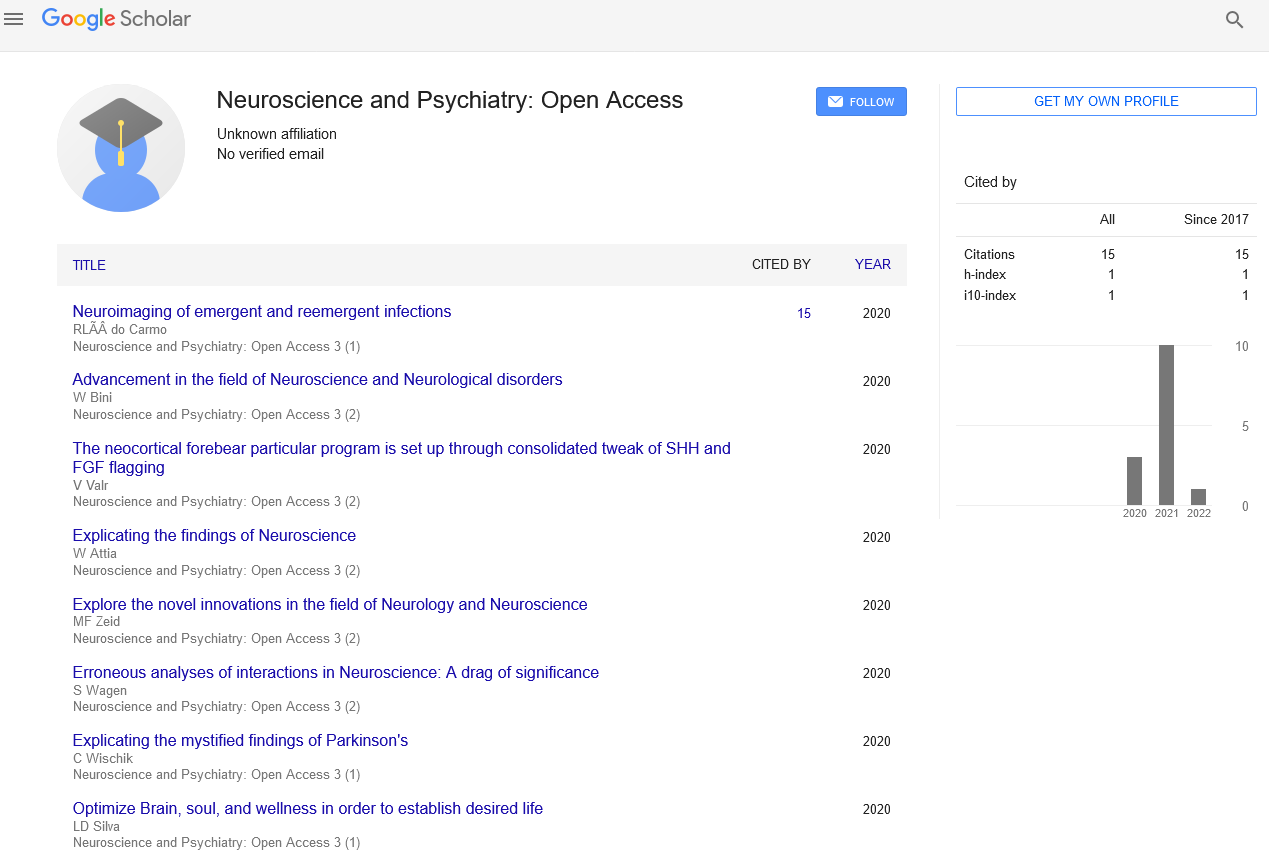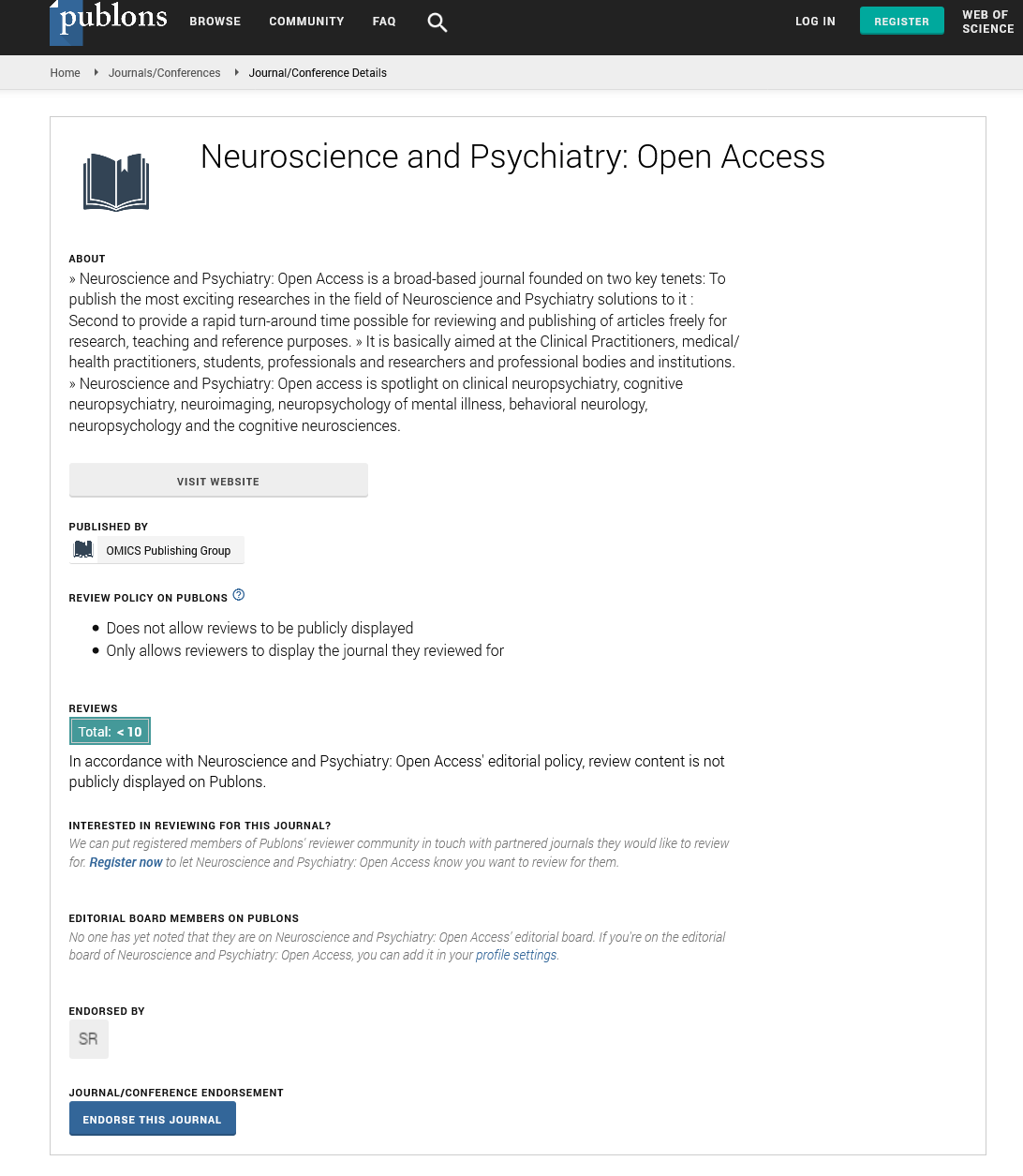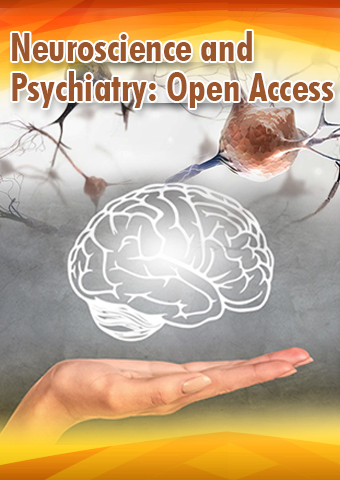Perspective - Neuroscience and Psychiatry: Open Access (2023) Volume 6, Issue 5
Genetics and Neuroscience: Unraveling the Secrets of the Brain
- Corresponding Author:
- Rocksheng Zhong
Department of Neuroscience and Psychiatry, University of California Irvine, Irvine, United States
E-mail: rozh87@utmb.edu
Received: 28-08-2023, Manuscript No. NPOA-23-119202; Editor assigned: 30-08-2023, PreQC No. NPOA-23-119202 (PQ); Reviewed: 13-09-2023, QC No. NPOA-23-119202; Revised: 20-09-2023, Manuscript No. NPOA-23-119202 (R); Published: 02-10-2023, DOI: 10.47532/npoa.2023.6(5).118-120
Introduction
The intricate relationship between genetics and neuroscience represents a captivating journey into the fundamental mysteries of the brain. While neuroscience explores the intricate workings of the brain, genetics delves into the genetic code that shapes our neural architecture. This article delves into the exciting intersection of genetics and neuroscience, examining the profound impact of genetic research on our understanding of brain development, function, and the treatment of neurological disorders.
Description
Genetics and neuroscience: A dynamic intersection
Genetic contributions to neurological disorders: The human brain is an extraordinary and complex organ, comprised of billions of neurons and trillions of synapses, responsible for our thoughts, emotions, and actions. Genetic factors play a significant role in determining the structure and function of the brain, as well as influencing our susceptibility to neurological disorders.
Hereditary influences: The hereditary aspect of neurological disorders, such as Alzheimer’s disease, Parkinson’s disease, and epilepsy, has long been recognized. Many of these conditions have a strong genetic component, meaning that they tend to run in families.
Genetic diversity: The human genome is remarkably diverse, and this genetic diversity is mirrored in the structure and function of our brains. Variations in our DNA influence the brain’s development, its resilience to damage, and its susceptibility to diseases and disorders.
Genetic research in neuroscience
The human genome project: The human genome project, a monumental scientific endeavor launched in the 1990’s, aimed to sequence and map all the genes in the human genome. This groundbreaking effort significantly advanced our understanding of human genetics, providing a wealth of information that continues to benefit the field of neuroscience.
GWAS and neurological disorders: Genome-Wide Association Studies (GWAS) have become a valuable tool for identifying genetic variants associated with neurological disorders. These studies involve scanning the entire genome for genetic markers linked to specific conditions, enabling the discovery of novel genetic risk factors.
Advances in technology: The advent of next-generation sequencing technologies has revolutionized genetic research in neuroscience. These technologies have made it more accessible and affordable to sequence an individual’s entire genome or exome, leading to numerous discoveries related to neurological disorders.
Key areas of genetic research in neuroscience
Brain development: Genetic factors play a pivotal role in shaping the architecture of the developing brain. These influences include the regulation of neuronal proliferation, differentiation, migration, and synaptogenesis. Genetic variations can lead to developmental disorders, such as autism spectrum disorder, intellectual disabilities, and cerebral palsy.
Neurotransmission: Genetics also impacts the functioning of neurotransmitter systems in the brain. Variations in genes encoding neurotransmitter receptors, transporters, and enzymes can affect the transmission of signals between neurons, contributing to various neuropsychiatric conditions, including depression, schizophrenia, and bipolar disorder.
Neurodegeneration: Many neurodegenerative diseases, including Alzheimer’s disease, Parkinson’s disease, and Amyotrophic Lateral Sclerosis (ALS), are associated with specific genetic mutations. These mutations can lead to the accumulation of abnormal proteins, neuronal dysfunction, and ultimately, the degeneration of brain structures.
Epilepsy: Epilepsy, a common neurological disorder characterized by recurrent seizures, has a strong genetic component. Researchers have identified various genetic mutations that increase the risk of epilepsy. Understanding the genetic basis of epilepsy is essential for developing targeted treatments and improving patient outcomes.
Precision medicine: The field of genetics has opened doors to precision medicine in neuroscience. By identifying an individual’s unique genetic makeup, clinicians can tailor treatments to target the specific genetic factors contributing to their neurological disorder. This personalized approach holds great promise for improving the effectiveness of therapies and reducing side effects.
Ethical considerations in genetic research
Informed consent: Obtaining informed consent from individuals participating in genetic research is of paramount importance. Participants should fully understand the potential implications of genetic testing, including the potential discovery of unexpected genetic information.
Privacy and data security: The confidentiality and security of genetic data are critical ethical considerations. Safeguards must be in place to protect individuals’ genetic information from misuse and unauthorized access.
Genetic discrimination: Genetic discrimination, also known as genomic discrimination, occurs when individuals are treated unfairly based on their genetic information. To address this concern, legislation such as the Genetic Information Nondiscrimination Act (GINA) in the United States has been enacted to protect individuals from genetic discrimination in employment and health insurance.
Psychosocial impacts: The discovery of a genetic risk factor for a neurological disorder can have profound psychosocial impacts on individuals and their families. Genetic counselors play a crucial role in helping individuals navigate the emotional and ethical challenges associated with genetic testing.
The future of genetics and neuroscience
Targeted therapies: The increasing understanding of the genetic basis of neurological disorders paves the way for the development of targeted therapies. Precision medicine approaches can address the specific genetic factors contributing to an individual’s condition, potentially revolutionizing treatment outcomes.
Early detection and prevention: Genetic research offers the potential for early detection of neurological disorders, even before clinical symptoms manifest. This early detection allows for interventions to be implemented when they are most effective, potentially delaying or preventing the onset of the disease.
Innovative therapies: Genetics research has provided insights into novel therapeutic targets for neurological disorders. Emerging treatments, such as gene therapy and gene editing, hold promise for correcting genetic mutations that underlie these conditions.
Continued collaboration: The interdisciplinary collaboration between geneticists, neuroscientists, and clinicians is essential for advancing our understanding of the genetic basis of neurological disorders and translating research findings into clinical practice. This collaboration can help bridge the gap between genetic discoveries and improved patient care.
Conclusion
The dynamic intersection of genetics and neuroscience is transforming our understanding of the brain and neurological disorders. Genetic research has revealed the genetic underpinnings of brain development, neurotransmission, neurodegeneration, and epilepsy, among other areas. It has opened the door to precision medicine, targeted therapies, and early detection and prevention of neurological disorders.
While the field of genetics in neuroscience has seen significant advancements, it also raises important ethical considerations regarding informed consent, privacy, genetic discrimination, and psychosocial impacts. As genetic research in neuroscience continues to expand, the collaboration between geneticists, neuroscientists, and clinicians will be critical in harnessing the potential of genetics to enhance our understanding of the brain and improve patient outcomes.


